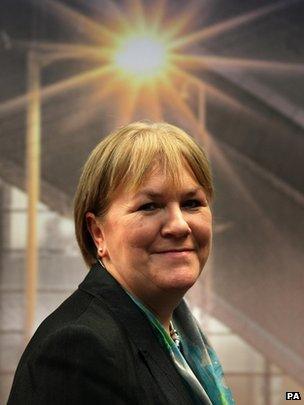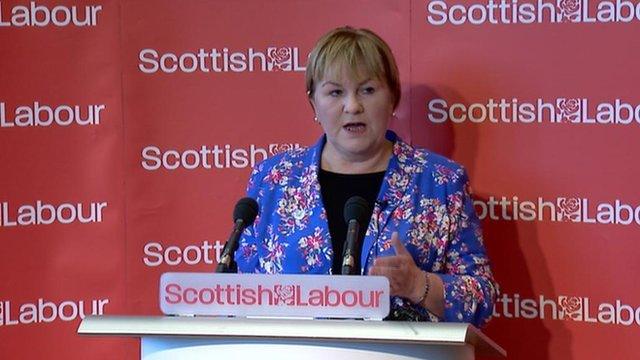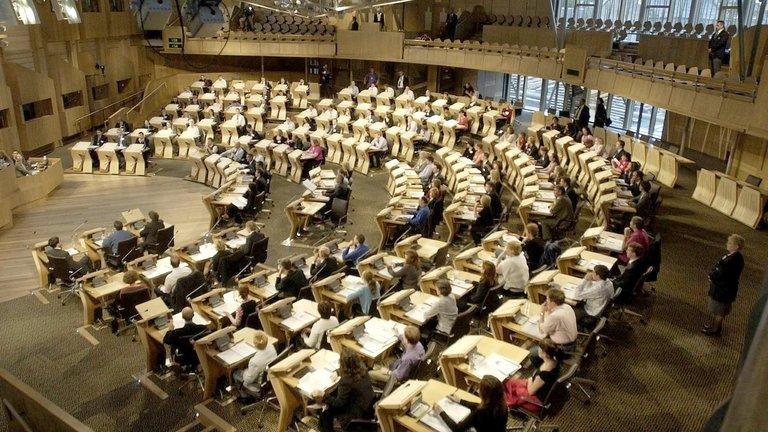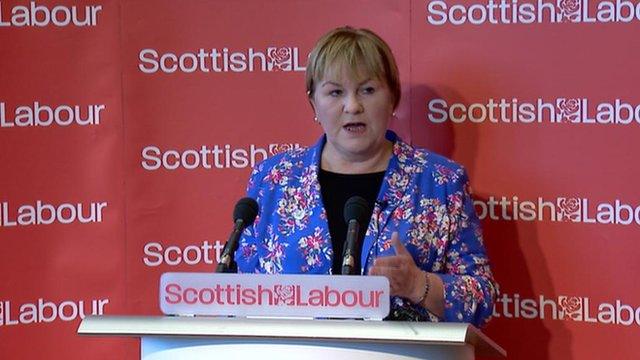Follow my leader
- Published

Johann Lamont says she wants an honest debate on universal benefits
Not everyone, Johann Lamont has told the Labour conference, is going to like the policy prescriptions she is outlining.
As she is undoubtedly only too well aware, that includes members of her own party. It includes parliamentary colleagues at Holyrood.
Last week, Ms Lamont questioned the net value of universal benefits such as free prescriptions and university tuition, weighed against public spending strategy more generally. She also queried the value of a continuing council tax freeze.
The extent of the political challenge which now confronts her is easily exemplified by a glance at the opening section of her Manchester speech.
She lauds Labour's triumph in Glasgow at the council elections in May. She describes the party's group leader in Glasgow, Gordon Matheson, as generating a "stunning" victory for Labour.
Now, Ms Lamont is a Glasgow MSP and was in the hall at the SECC for the count. For Labour, seeking to revive, this is emotional stuff. Cathartic, core.
Snag is her SNP opponents, pests that they are, may prefer to sidestep the "stunning" nature of the success and focus rather upon the manifesto which returned Councillor Matheson to power.
In their pedantic way, they may draw attention to the big picture of Mr Matheson and Ms Lamont, with colleagues, followed on the very next page by "100 things we will do".
Number one in that list of promises? "Labour was the first council in Scotland to introduce a council tax freeze, and will continue to freeze council tax for the next 5 years."
Ms Lamont, of course, has answers ready. This was the Glasgow manifesto, not her personal pledge. Circumstances change. In any event, she has not specifically ruled out a further freeze - merely questioned its efficacy.
Johann Lamont: "Everything comes at a cost."
Not sure that is going to forestall entirely the persistent questions which will come her way.
But then she knows that. She anticipates that. The remainder of her speech pursues two paths.
One, arguing that the poor and the disadvantaged are losing out while universality of provision stretches limited cash too thinly.
Two, the political case, that the SNP are amplifying the impact of cuts delivered by the Conservatives. We are back in "Tartan Tory" territory, the jibe aimed at the SNP in the past.
Both arguments are rebutted by SNP ministers. They say their approach - on, for example, the council tax freeze - helps hard-pressed families. They say they have sought to drive economic growth within the constraints of the budgetary settlement.
Team Lamont
That will be an intriguing argument in the weeks and months ahead. For now, one hears a degree of disquiet in Labour ranks. Only, I stress, a degree - not by any means insurrection.
Why, some ask, could this not have been discussed more substantially within the party prior to launch?

The Labour leader raises the question of free personal care for the elderly
The answer to that is the answer which greets all such complaints - that a leader must lead, that Team Lamont knew the impact of the issue and wanted to control the content of publication rather than seeing it leak out in a haphazard fashion.
The second point, however, has more lasting substance. When, some ask within Labour, are we going to get concrete information about the alternatives to the "goodies" presently on offer?
Their concern is that - whether justified or not, whether sensible or not - the SNP are offering precise, measurable benefits while Labour's offer is still somewhat nebulous.
The answer, presumably, is that the Labour proposal will take further shape as the review continues. As I said, intriguing.
Consultation update
PS: A little sidebar to the item I ran yesterday. I had suggested that publication of the responses to the Scottish government consultation on the referendum might be deferred as the emphasis now was upon reaching a deal with the UK government.
In passing, I had reported that such a deferral was backed, indeed initially suggested, by the UK government.
In the way that one does, I have now received an alternative scenario. Not a UKG wheeze, I am told.
UK ministers, I am advised, are scarcely going to cause a fuss and press for publication now. They are not inclined to make mischief. But they dissent, ever so gently, from the notion that it was their idea.
Consensus, though, appears to persist.
The deal takes priority over publication. To stress once more, it is emphasised by the Scottish government that the consultation has played a real role in formulating their strategy.
- Published2 October 2012

- Published27 September 2012

- Published25 September 2012
